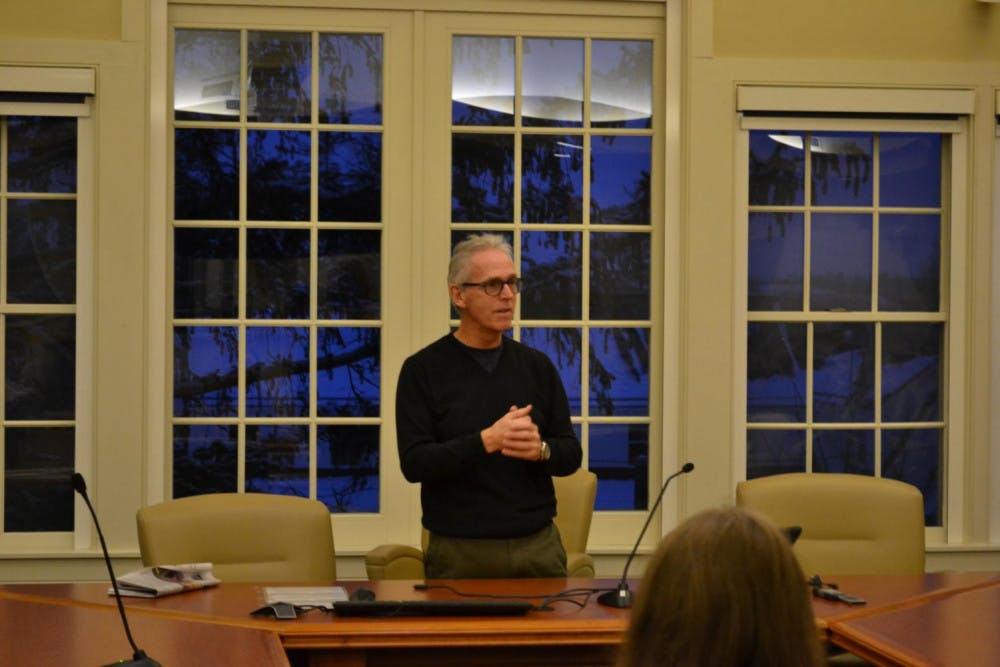On the evening of Thursday, January 18, students and faculty gathered at the Robert A. Jones Conference Room to hear the talk “Russian Media Today,” delivered by Derk Sauer, CEO and founder of the Moscow Times. Sauer offered insights into the social, economic and political conditions affecting Russia, and shared how his publishing company gained popularity. Headquartered in the Russian capital, the Moscow Times is a weekly English-language newspaper first published in 1992.
To begin his talk, Sauer presented a reality of Russia misunderstood by most Americans. He insisted that Putin and Russia “are not the same thing,” and that people are mistaken to focus their attention on one person when examining the political character of a nation. Many people in Russia actually disassociate themselves from Putin. Sauer admits, however, that talking about Russia is difficult because of its massive size and diverse population. He suggests attempting to understand the country as belonging to three different societies.
The first society comprises those living away from the cities, many of whom are unable to access today’s technology. Sauer even compares their lifestyle to being stuck in time 100 years ago.
The second society contains private enterprises. Currently, Russia is experiencing growth in the technology sector, with some locations incubating startups like Silicon Valley’s. Sauer considered the Moscow Times to belong to this category before it was sold, since he needed to find and attract a market to become successful. Interestingly, he pointed out that more women lead companies in Russia than anywhere else in Europe or the United States.
The third society consists of rich industrialist oligarchs. He estimates that there are 1,000 people in Moscow who know each other and are in control of the city’s important institutions. One famous example brought up by Sauer was Mikhail Prokhorov, who gained his fortune producing nickel and palladium and was wealthy enough to become owner of the Brooklyn Nets.
For the past 20 years, some of the most powerful oligarchs have included media owners because media is used to influence public opinion. With money being exchanged for articles, Sauer insists that journalism in Russia is corrupted. Conversely, newspapers in Russia threaten companies with malicious articles in return for advertisements.
As the talk progressed, Sauer spoke at length about managing the Moscow Times. He humorously recalled how he once fired 1,000 employees because he encountered many people who were unsure of their jobs at the company. Sauer considered such organizational inefficiency to be very “Soviet.”
The Moscow Times’ popularity began to skyrocket during the Ukrainian crisis in 2014. The Times was the only media company to cover the event, and it became the biggest news outlet in the country, exceeding state television. Once the company became profitable, Sauer sold it to Prokhorov, who initially refused the offer out of fear of upsetting the Kremlin. Despite his enormous power over the newspaper, Prokhorov never told the Times what to write.
Sauer shared his own stories about his troubles with the Kremlin. The Moscow Times reported that Putin’s son-in-law became a billionaire at 32 because the state bank gave him $1.3 billion to buy shares in the company where he works. The Times also wrote about Putin’s daughter becoming the chair of an important real estate committee in Russia. Such stories did not sit well with the Kremlin, and Prokhorov’s offices were raided as a result. For the Moscow Times, the message was clear: writing about Putin and his inner circle was off-limits. Prokhorov was forced to sell the newspaper, and Sauer eventually left Russia.
After the talk was finished, Sauer opened the floor for questions.
“Media is a big way [Russia] control[s] information, and so knowing how the media works lets you really understand how to play the game in Russia,” said Charles Smith ‘20. “If you don’t play the game, they’ll kick out the country, or put you in jail, or have you killed. It’s sort of a critical way of understanding how business works in the country, how politics works, pretty much how everything works. So if you can follow the flow of information, you can make a connection.”



